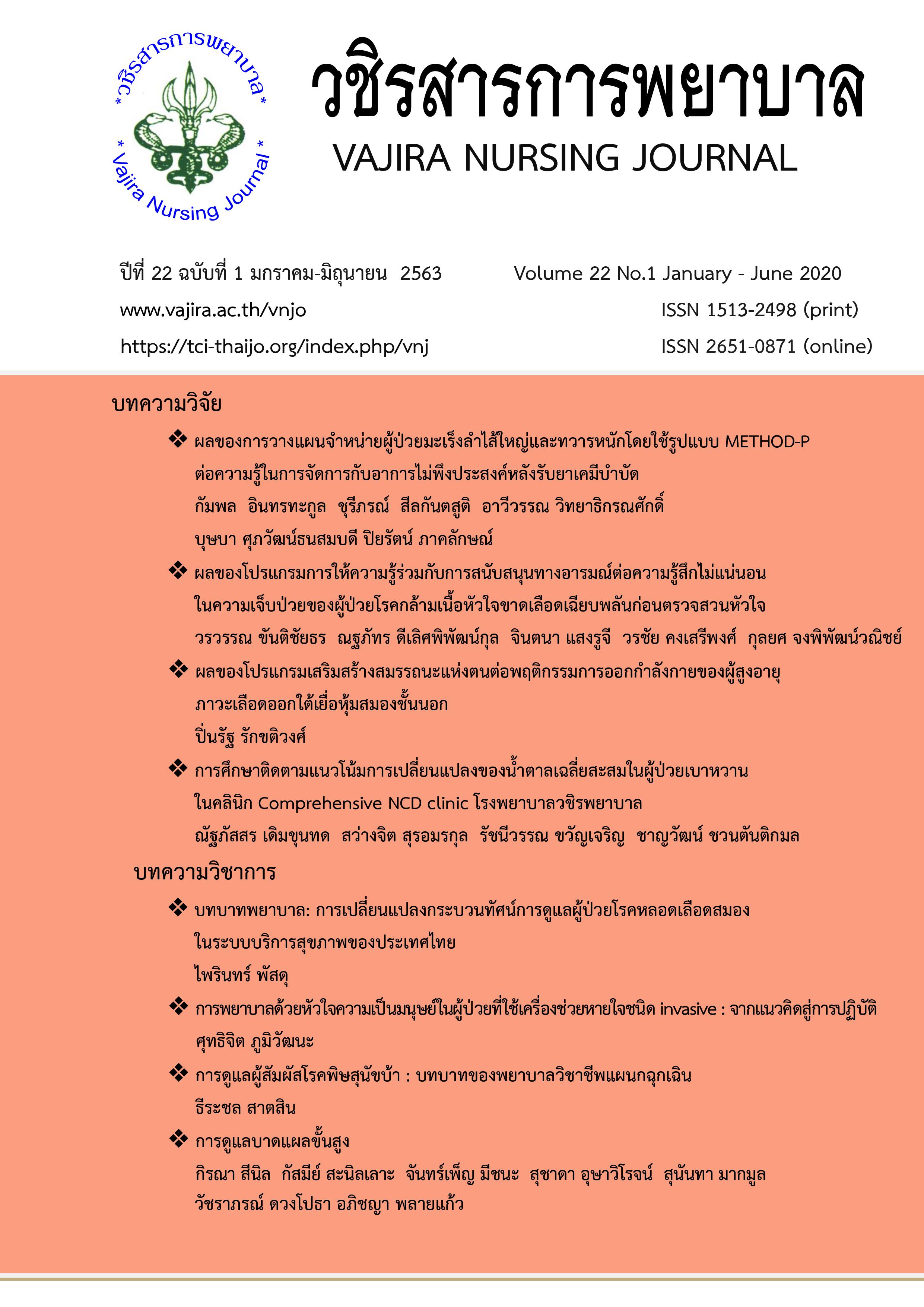ผลของโปรแกรมการให้ความรู้ร่วมกับการสนับสนุนทางอารมณ์ต่อความรู้สึกไม่แน่นอน ในความเจ็บป่วยของผู้ป่วยโรคกล้ามเนื้อหัวใจขาดเลือดเฉียบพลันก่อนตรวจสวนหัวใจ
Main Article Content
บทคัดย่อ
การศึกษาครั้งนี้เป็นการวิจัยกึ่งทดลองมีวัตถุประสงค์เพื่อศึกษาผลของโปรแกรมการให้ความรู้ ร่วมกับการสนับสนุนทางอารมณ์ต่อความรู้สึกไม่แน่นอนในความเจ็บป่วยของผู้ป่วยโรคกล้ามเนื้อหัวใจขาดเลือดเฉียบพลัน ก่อนตรวจส่วนหัวใจ ในผู้ป่วยโรคกล้ามเนื้อหัวใจขาดเลือดเฉียบพลัน โรงพยาบาลวชิรพยาบาลคณะแพทยศาสตร์วชิรพยาบาล มหาวิทยาลัยนวมินทราธิราช เก็บรวบรวมข้อมูลตั้งแต่วันที่ 1 ธันวาคม 2561 ถึง 30 เมษายน 2562 ระยะเวลา 5 เดือน โดยผู้วิจัยได้สร้างขึ้นตามกรอบแนวคิดของมิเชล (1988)กลุ่มตัวอย่างเป็นผู้ป่วยโรคกล้ามเนื้อหัวใจขาดเลือดเฉียบพลัน คัดเลือกตามเกณฑ์ที่กำหนด จำนวน 30 คน โดยกลุ่มตัวอย่างได้รับการคัดเลือกแบบเฉพาะเจาะจง เครื่องมือที่ใช้ในการรวบรวมข้อมูล ประกอบด้วย แบบสอบถามข้อมูลส่วนบุคคลและแบบสอบถามความรู้สึกไม่แน่นอนในความเจ็บป่วยของผู้ป่วยโรคกล้ามเนื้อหัวใจขาดเลือดเฉียบพลัน ประกอบด้วย 4 ด้าน คือ 1) ด้านความคลุมเครือในความเจ็บป่วยและการรักษา 2) ด้านความซับซ้อนของการรักษาและระบบบริการสุขภาพ 3) ด้านความไม่สม่ำเสมอในเรื่องข้อมูลเกี่ยวกับความเจ็บป่วยและการรักษา และ 4) ด้านไม่สามารถทำนายผลลัพธ์ของความเจ็บป่วยและการรักษาได้ ข้อคำถามทั้งหมด 24 ข้อ วิเคราะห์ผลการวิจัยด้วยโปรแกรมสำเร็จรูป ข้อมูลส่วนบุคคลนำมาแจกแจงความถี่ร้อยละ เปรียบเทียบความแตกต่างค่าเฉลี่ยความรู้สึกไม่แน่นอนในความเจ็บป่วยก่อน และหลังได้รับโปรแกรมของกลุ่มตัวอย่างโดยใช้สถิติ paired t-test
ผลการใช้โปรแกรมการให้ความรู้ร่วมกับการสนับสนุนทางอารมณ์ของผู้ป่วย โรคกล้ามเนื้อหัวใจขาดเลือดเฉียบพลัน ที่เข้ารับการตรวจสวนหัวใจ พบว่า คะแนนเฉลี่ยความรู้สึกไม่แน่นอนในความเจ็บป่วยโดยรวม
หลังได้รับโปรแกรมฯ ลดลงจาก 3.46 (S.D.= 0.38) เป็น 1.72 (S.D.= 0.31) อย่างมีนัยสำคัญทางสถิติ (p-value < 0.001) ผลการวิจัยแสดงให้เห็นว่าโปรแกรมการให้ความรู้ร่วมกับการสนับสนุนทางอารมณ์สามารถลดความรู้สึกไม่แน่นอนในความเจ็บป่วยของผู้ป่วยโรคกล้ามเนื้อหัวใจขาดเลือดเฉียบพลันก่อนตรวจสวนหัวใจ
Article Details

อนุญาตภายใต้เงื่อนไข Creative Commons Attribution-NonCommercial-NoDerivatives 4.0 International License.
เนื้อหาและข้อมูลในบทความที่ลงตีพิมพ์ในวชิรสารการพยาบาลถือเป็นข้อคิดเห็นและความรับผิดชอบของผู้เขียนบทความโดยตรง ซึ่งกองบรรณาธิการไม่จำเป็นต้องเห็นด้วย หรือร่วมรับผิดชอบใด ๆ ทั้งสิ้น
บทความ ข้อมูล เนื้อหา รูปภาพ ฯลฯ ที่ได้รับการตีพิมพ์ในวชิรสารการพยาบาล ถือเป็นลิขสิทธิ์ของวชิรสารการพยาบาล หากบุคคลใดหรือหน่วยงานใดต้องการนำทั้งหมดหรือส่วนหนึ่งส่วนใดไปเผยแพร่ต่อหรือเพื่อกระทำการใด ๆ จะต้องได้รับอนุญาตเป็นลายลักอักษรจากวชิรสารการพยาบาลก่อนเท่านั้น
เอกสารอ้างอิง
กระทรวงสาธารณสุข, สำนักโรคไม่ติดต่อ. (2560).จำนวนและอัตราตายโรคไม่ติดต่อและอุบัติเหตุทางถนนต่อประชากรแสนคน จำแนกตามจังหวัดในเขตบริการสาธารณสุข และจำแนกตาม สคร.12 เขต และภาพรวมประเทศ(รวมกรุงเทพมหานคร) ปี 2557 สืบค้นจาก http://www.thaincd.com/ information statistic/non-communicable-disease-data.php.
กองยุทธศาสตร์และแผนงาน สำนักงานปลัดกระทรวงสาธารณสุข กระทรวงสาธารณสุข. (2561). สรุปสถิติที่สำคัญ พ.ศ. 2561. สืบค้นจาก http://www.bps.moph.go.th.
กอบกาญจน์ ศรประสิทธิ์. (2550). การผสมผสานภูมิปัญญาตะวันออกในการดูแลสตรีที่เป็นโรคมะเร็งอวัยวะสืบพันธุ์. กรุงเทพฯ: อัลลายด์เพรส. หน้า 96.
ขวัญเมือง สอนดา. (2558). ปัจจัยทำนายความวิตกกังวลในผู้ป่วยโรคหลอดเลือดหัวใจก่อนการสวนหัวใจ. วิทยานิพนธ์ปริญญาพยาบาลศาสตรมหาบัณฑิต สาขาวิชาการพยาบาลผู้ใหญ่ บัณฑิตวิทยาลัย. มหาวิทยาลัยมหิดล.
ดวงเดือน สุวรรณพันธ์. (2544). ผลของการได้รับข้อมูลและการรับรู้แบบไม่รู้สึกตัวต่อความรู้สึกไม่แน่นอนในความเจ็บป่วยของผู้ป่วยที่ได้รับการรักษาด้วยการขยายหลอดเลือดหัวใจ. วิทยานิพนธ์ปริญญาพยาบาลศาสตรมหาบัณฑิต สาขาการพยาบาลผู้ใหญ่ บัณฑิตวิทยาลัย. มหาวิทยาลัยมหิดล.
นิตยา โรจน์ทินกร. (2536). ความสัมพันธ์ระหว่างความรู้สึกไม่แน่นอนในความเจ็บป่วยและพฤติกรรมการปรับตัวในผู้ป่วยมะเร็งที่ได้รับรังสีรักษา. วิทยานิพนธ์ปริญญาพยาบาลศาสตรมหาบัณฑิตสาขาวิชาการพยาบาลอายุรศาสตร์และศัลยศาสตร์ บัณฑิตวิทยาลัย. มหาวิทยาลัยเชียงใหม่.
พิมพา เทพวัลย์ ดวงรัตน์ วัฒนกิจไกรเลิศ คะนึงนิจ พงศ์ถาวรกมล และฉัตรกนก ทุมวิภาต. (2554). การรับรู้การเจ็บป่วย การตอบสนองทางอารมณ์และประสบการณ์และการเข้ารับการรักษาในโรงพยาบาล ในการทำนายการตัดสินใจมารับการรักษาของผู้ป่วยกลุ่มอาการกล้ามเนื้อหัวใจขาดเลือดเฉียบพลัน. วารสารพยาบาลศาสตร์, 29(1), 111-119.
ละมัย อยู่เย็น. (2559). ผลของโปรแกรมการสนับสนุนด้านข้อมูลและด้านอารมณ์ต่อความรู้สึกไม่แน่นอนในความเจ็บป่วยของผู้ป่วยหลอดเลือดหัวใจก่อนตรวจสวนหัวใจ. วิทยานิพนธ์ปริญญาพยาบาลศาสตรมหาบัณฑิต สาขาวิชาการพยาบาลผู้ใหญ่ บัณฑิตวิทยาลัย. มหาวิทยาลัยคริสเตียน.
วศินี สมศิริ, และจินตนา ชูเซ่ง. (2553). ผลของการให้ความรู้อย่างมีแบบแผนต่อความรู้ความสามารถและพฤติกรรมการดูแลตนเองในผู้ป่วยโรคหลอดเลือดหัวใจที่เข้ารับการทำหัตถการหลอดเลือดหัวใจ โรงพยาบาลสงขลานครินทร์. วิทยานิพนธ์ปริญญาพยาบาลศาสตรมหาบัณฑิต สาขาการพยาบาลผู้ใหญ่ บัณฑิตวิทยาลัย. มหาวิทยาลัยสงขลานครินทร์
สมภพ เรืองตระกูล. (2544). อาการทางจิตเวชในผู้ป่วยโรคทางกาย. กรุงเทพ: เรือนแก้วการพิมพ์.
สำนักนโยบายและยุทธศาสตร์ สำนักงานปลัดกระทรวง วิเคราะห์ข้อมูลโดยกลุ่มยุทธศาสตร์และแผนงาน สำนักโรคไม่ติดต่อ ปี 2555-2557.
อภิชาต สุคนธสรรพ์. (2543). โรคหลอดเลือดหัวใจโคโรนารี. เชียงใหม่: ไอเด็นติตี้กรุ๊ป.
Bashore, T.M., Berger, P.B., O’Laughlin, M.P., Dehmer, G.J. (2001). American College of Cardiology/Society for Cardiac Angiography and Interventions Clinical Expert Consensus Document on Cardiac Catheterization Laboratory Standards. Catheterization and Cardiovascular Intervention, 53, 281-286.
Elliott D. (1994). The effects of music and muscle relaxation on patient anxiety in a coronary care unit. Heart Lung. 23(1), 27-35.
Houston, S.,Eagen, M.,Freeborg, S.,& Dougherty, D. (1996). A comparison of structured versus guide preheat catheterization information on mood states and coping resources. Applied Nursing Research, 9(4), 189-194.
Kern, M.J. (2003). The cardiac catheterization handbook. Missouri: Mosby.
Lazarus, R. S. & Folkman, S. (1984). Stress, appraisal and coping. New York: Springer Publishing.
Lunden, M.H., Bengtson, A.,& Lundgren, S.M. (2006). Hours during and after coronary intervention and angiography. Clinical Nursing Research, 15(4), 274-289.
Lukkarinen, H., & Lukkarinen, O. (2007). Sexual satisfaction among patients after coronary bypass surgery or percutaneous tranluminal angioplasty: Eight-year follow-up. Heart & Lung, 36(4), 262-269.
McNamara, E.M., Burnham., C. D., Smith, C., & Carroll. L.D. (2003). The effects of back massage before diagnostic cardiac catheterization.Alternative Therapies, 9(1), 50-56.
Mishel, M. H. (1988). Uncertainty in illness. Image: Journal of Nursing Scholaship, 20(4), 225-232.
Nguyen, QN., Pham, ST., Do, LD., Nguyen, VL., Wall, S., Weinehall, L., Bonita, R., &
Byass, P. (2012). Cardiovascular disease risk factor patterns and their implication for intervention strategies in vietnam. Int J Hypertens,
http://doi.org/10.115/2012/560397.
Oka, R. K., Burke, L.E., & Froelicher, E.S.S. (1995). Emotional Responses and Inpatient Cardiac Nursing (3rd ed). Philadelphia: J.B.Lippincott.
Okvat, A. H., Ting W.,& Namerow B.P. (2002). Massage therapy for patients undergoing cardiac catheterization. Alternative Therapies, 8(1), 68-75.


